Relationship Guru Esther Perel on How the Pandemic Affected Our Love Lives
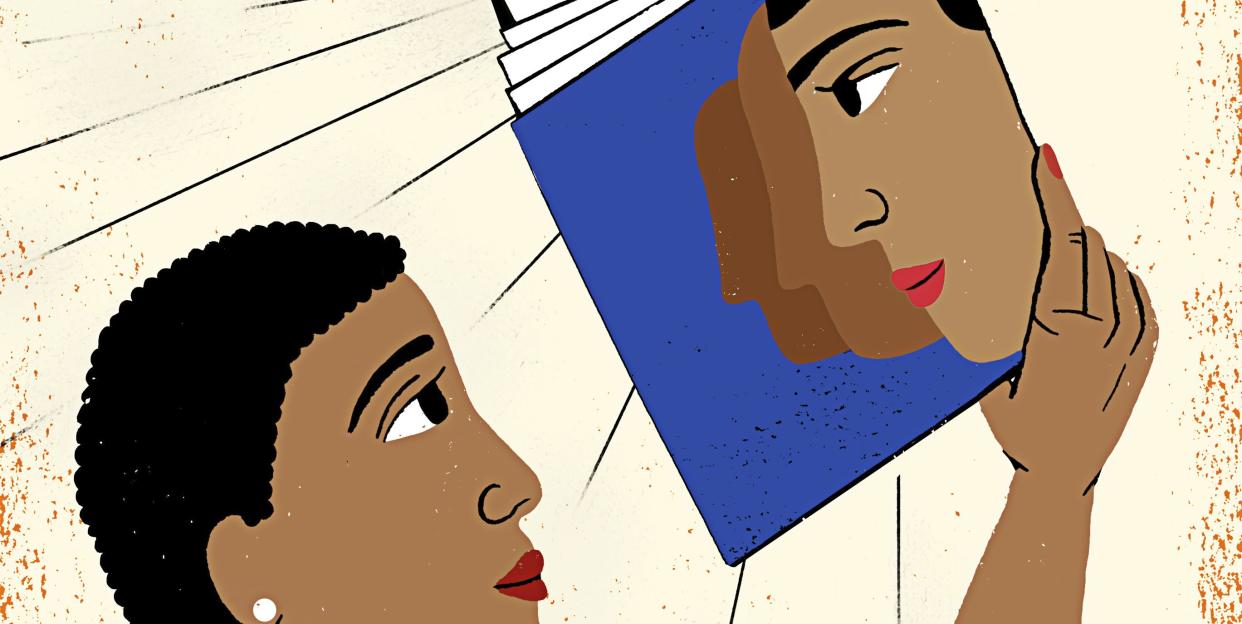
- Oops!Something went wrong.Please try again later.
- Oops!Something went wrong.Please try again later.
"Hearst Magazines and Yahoo may earn commission or revenue on some items through these links."
This story is from the Summer 2021 issue of O Quarterly, available to you as an Oprah Insider. To share more info about becoming an Oprah Insider with your loved ones, click here.
Our Bookshelves, Ourselves
When they couldn’t meet in person, Idrissa Simmonds-Nastili and her friends found one another in the pages of their books.
I grew up in a household of bibliophiles. Paperbacks, encyclopedias, historical fiction, and everything in between inhabited closets, lined the walls of rooms, and sat an arm’s reach away on side tables. I came to understand early that books were healers, and not only because I found resonance and comfort in individual volumes. There was something about the magic of a home library that soothed and empowered me.
In this year of Covid-19 and a constant stream of violence against Black bodies, two things happened. First, my book collection blossomed exponentially. Second, book tending—the intentional act of curating and experiencing books in one’s living space as a tool for pleasure, peace, and restoration—took on a communal element with Black women in my life in lieu of our ability to gather and heal in one another’s homes. Through text, video, and voice message, my kin and I erected a collective canon of books that remind us that if there is breath in our bodies, there is a survival story we can tell.
In March 2021, I shared a photo of all the Toni Morrison books I own, with the caption “The best syllabus I’ve read.” One sister responded with a photo of her own Ms. Morrison books. “Twinsies!” she wrote; our shelves were nearly identical. To suddenly be in a collective dialogue in the midst of the year’s isolation, distance, and compounding grief was a delight. Moments later, another friend sent a photo of her Morrison shelf captioned “Shrines.” Each of our shelves held a copy of Sula, published in 1973, whose last line—“It was a fine cry—loud and long—but it had no bottom and it had no top, just circles and circles of sorrow”—speaks to the mourning and grief all of us in that conversation have known this year.
In a Zoom session with a group of Black folks I write with, we discussed the fatigue, grief, and rage we felt. As we each shared our stories, others disappeared from their virtual square to return with a book. “Sis, read this,” one would say, or “I got something for you,” before launching into a passage. The references ranged from the invitation to live a free and Black life found in Saidiya Hartman’s Wayward Lives, Beautiful Experiments; to the family history of Min Jin Lee’s Pachinko; to the pain, love, and survival of Jesmyn Ward’s Salvage the Bones; to the wisdom and humor in a collection of African American proverbs; to the resilience of Malinda Russell’s A Domestic Cookbook, the first cookbook self-published by a woman of color.
This virtual show-and-tell of our at-home canons across the country brought jokes, joy, and curiosity into our tears. We added photos of the books to our group chat. Every now and then I return to the chat, scrolling through the covers, settling back into myself as I remember how we used our libraries to move beyond our individual losses and snatch one another back from pain.
“If I died without a journal, people would say, ‘I know who this woman was,’” my friend Dionne says about her home library. Perhaps this is the heart of it—in a year of being so deeply unmoored, our book tending is a reminder of who we are at our core, beyond the limits of the world we inhabit. I can look at my shelves and chart my life outside the devastations of 2020. And sharing this with other Black folks who are hurting, and having them share back with me, is one quiet way we re-anchor and recenter ourselves.
From New Jersey, with Love
After years of watching her husband put her needs first, Amy Maclin decided to take a revolutionary step.
My husband, Sasha, who grew up in Ukraine in the '70s and '80s, has been through some crazy stuff. As a soldier, he narrowly missed getting deployed to Afghanistan. When the Soviet Union fell and food supply chains collapsed, he picked cucumbers and cabbages on a collective farm. Galloping inflation meant paper bills were worth so little that on payday, he had to carry his salary home from his regular job in a large bag stuffed with stacks of cash, like a fairy tale character with a sack of gold.
Being married to someone who’s been through Hard Times isn’t always easy. When the air conditioner goes out or I’m spitting fireballs after being on hold with the cable company for eight hours, he’ll say, “In the Soviet Union...” and launch into an anecdote of misery, like he’s raising the stakes in a poker game: “I’ll see your momentary discomfort and raise you the collapse of a society.”
But I’ll admit, I’ve also taken advantage of his Slavic stoicism. Until recently, we lived in Manhattan, within walking distance of my office; he worked in New Jersey and commuted over an hour each way. Partially that’s because I was the breadwinner, but it also jived with our ongoing narrative—i.e., he was a survivor and I was a whiny-ass baby.
When the pandemic hit, I took strange comfort in the fact that he’d never been through a crisis like this one before, and at least we were going through it together. “Toilet paper shortages—it’s just like Soviet times!” I joked. You know, like Soviet times, but with liquor delivery and Disney Plus.
And yet he was still pulling perfect 10s in the Struggle Olympics: Unlike my privileged self, he couldn’t telecommute, so he got a collapsible bike to ride partway, thus avoiding potential Covid transmission on the subway. Then, one rainy night, my unflappable husband came home with his legs scraped raw because he’d fallen on the steep ramp that leads from the Hudson River up to Trump Place (which seemed fitting). He stood staring at me with blood running down his shins in the tiny kitchen of our slightly grimy postage-stamp-size apartment.
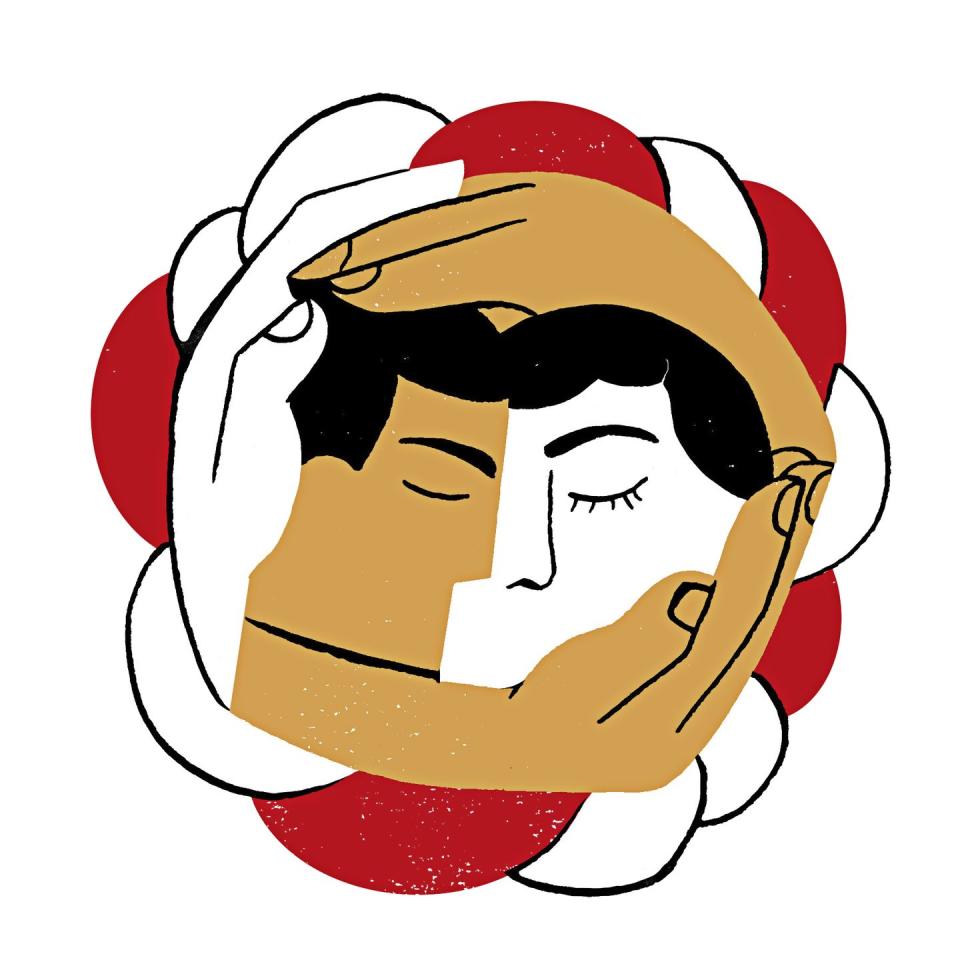
Let me digress: I adored that apartment. It was on the Upper West Side, the setting for so many movies I’d loved as a child growing up in semi-rural Tennessee. To Sasha, the Upper West Side was just a place where bread cost $9, while I couldn’t believe that I got to live there. I was certain someone was going to tap me on the shoulder and say, “Ma’am, there’s been a mistake. Here’s your bus ticket back to Hooterville.” The only way I could imagine leaving was if a dream crusher showed up to drag me away. Until I looked back at my husband, with blood now running onto his shoes, and found myself saying, “Let’s move to New Jersey.”
Which is how I wound up in a vast apartment complex next to a Popeye’s and the lot where they filmed Big Pussy’s auto shop in The Sopranos. Even though I’m no longer tripping through life accompanied by a Gershwin tune, it’s not so bad here. First of all, the pizza is better (New Yorkers, fight me!). Also, we are so very lucky to be alive to eat it.
I feel more married in New Jersey, and not just because we live around the corner from a Costco. New York was a place where I lived; New Jersey is a place where we live. It took this upheaval to make me realize that I’d been suffering from a case of Main Character Syndrome: I was imagining myself starring in a movie, and everyone knows the main character has to be in Manhattan. But we were always an ensemble cast. Or, as they would have said in Soviet times, we are comrades, enduring for the sake of the collective!
For Better or for Worse
Relationship guru Esther Perel talks with books director Leigh Haber about love in the time of Covid.
Leigh Haber: As a couples therapist, how did you see lock-down impact relationships?
Esther Perel: The first thing that happened was a massive collapse of boundaries that was disorienting. People who worked from home saw all their roles literally collapse together under one roof: mother, CEO, shrink, supervisor, friend, daughter, and chef. Oh, and they had their gym in there, too. Their entire world was there. Normally we leave our partner during the day and interact with other people—we get to see ourselves through the reflections of others. But if during the entire day all I see is you, and all you see is me...well, that can get very tiring very quickly.
LH: It puts a lot of pressure on your domestic partner.
EP: Exactly. During quarantine, partners were looking to each other to provide the stimuli and emotional sustenance they usually get from their entire community. For some, that meant discovering how much they could rely on each other, how much they really needed each other, and whether they worked well as a team.
LH: We spent a year or so cooped up together, but it was so intense, it felt even longer.
EP: In order to flatten the Covid curve, people had to flatten themselves; the experience is doldrum and monotony interlaced with acute anxiety. That can make days seem interminable. But disasters and pandemics are also relationship accelerators. They put us closer to our sense of mortality. Life is short! Everything can end at any moment! That fragility is palpable, and it rearranges priorities. What do I want in this life? What are we waiting for? Let’s move in together! Let’s get married! Let’s have children!
LH: That’s one way it could go.
EP: And then there’s the other side: What am I waiting for? This is not what I want anymore. I’m out of here!
LH: What was the deciding factor in terms of staying together or breaking up?
EP: A couple’s strength or weakness isn’t rooted in differences in their coping styles. What matters is how complementary their styles are. If one panics: “We need to prepare; let’s buy toilet paper and disinfectant!” the other might keep it lighthearted and say, “I’m so glad I’ve got somebody who’s so organized!” A strong relationship maximizes those differences and turns them into a resource rather than an obstacle. When cracks appear, you have to ask yourself, How do I adapt to this? Because as Leonard Cohen says, “There is a crack in everything, that’s how the light gets in.”
Esther Perel is host of the podcast Where Should We Begin?
The Injury
Laid up during quarantine, writer Jenny Molberg realized that while her broken knee would heal, her relationship was beyond repair.
In February 2020, my body disappeared into an MRI machine like a spooked snail in its giant whirring shell. In the waiting room, the TV news mentioned a disease making its way across the globe. At that point, though, I was just concerned about my knee, which was swollen to twice its size. I had torn my meniscus while dancing to celebrate what I thought would be the start of a new life—I was engaged to be married that May. Now a dislodged hunk of cartilage the size of a Lego man floated above my kneecap.
I knew I would need surgery, followed by months of physical therapy. What I didn’t realize then was that I would spend those months quarantining with my fiancé, coparenting his kids half of each week, both of us working from home. I also did not yet know that he would never become my husband.
During my weeks of recovery, he cooked my meals, helped me dress, and carried my crutches to the car, guiding me up and downstairs. An ex-Marine and a father, he loved being a caretaker, a hero—but I didn’t love being taken care of. I began to feel more like his child than his partner, like someone who needed saving. Through my hydrocodone haze, I grew frustrated as I tried to show my gratitude but somehow always failed to make him feel appreciated; in turn, he became moody, withdrawn.
I tried to pull my weight. Twice a week, I panted into my mask at physical therapy, then brought home groceries I’d clean with rubbing alcohol. But otherwise confined to the couch, almost a wife and almost a stepmother, I began to feel like I was half my former self—almost a person. The amount of time my fiancé and I spent together didn’t bring us closer; instead, quarantine illuminated a growing distance between us, and at certain points I felt like I was living with someone I didn’t know, someone I’d never known. When Covid gave us a reason to postpone our wedding indefinitely, I felt relieved.
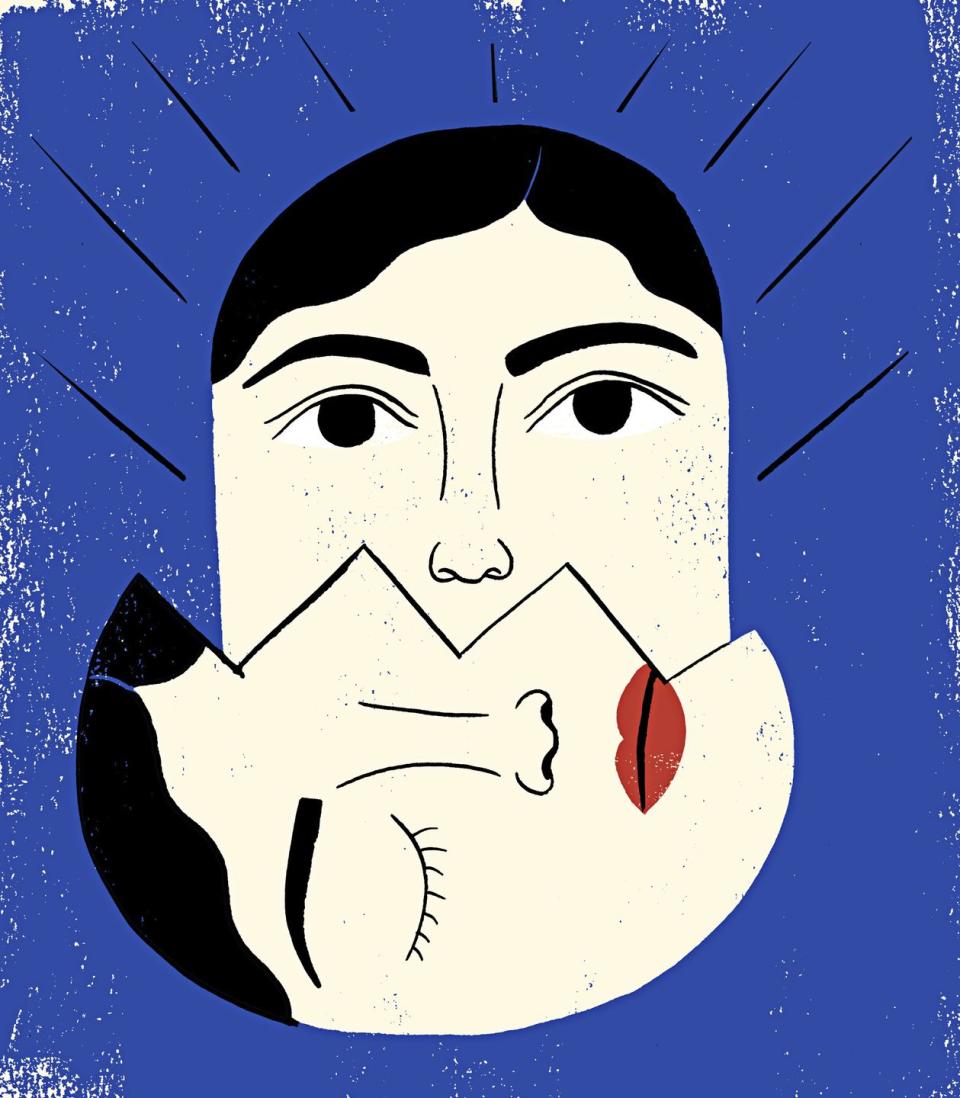
As the nation suffered trauma after trauma, my knee improved, slowly. I put on my sneakers and limped to racial justice protests. I told myself I should be grateful for my life, my health. But I felt stuck, both physically and emotionally—like I wanted to run but couldn’t.
In June, his two children had their birthdays a week apart. I made cupcakes that, when you bit into them, revealed rainbows. When the kids woke at night, I tried to comfort them. In our room, my fiancé and I stayed up for hours, discussing the fact that I seemed unhappy and distant. I tried to explain what was troubling me, that in a house full of people, I still felt alone, as if our world was black and white and no one could see me in all my shades and hues. I wanted him to join me in the Technicolor, but neither one of us knew how to bring him there.
That summer he began to travel for work. I wanted him at home so we could support each other through this difficult time. He said he was just doing his job, but I resented his choice to be out in the world when the rest of us were staying home in order to stay safe. Because he would work for a few days, come home, and then go back out again, I couldn’t figure out how to quarantine long enough to meet my newborn nephew. I started to feel he was prioritizing everyone else—anyone else—over me.
In August, he moved out and stayed with friends while we tried to talk through our issues over the phone at night. I started seeing a therapist online, and the image of my own face looked so tired, so unhappy, that I barely recognized myself. I left the house only to eat lunch at the park, under a sprawling pine tree, and I wished I were the tree.
After several months of sleepless nights spent talking in circles, I decided I should move out and let him keep the house for the kids. I couldn’t help but feel I was abandoning them, a particular kind of loss I wasn’t prepared for. The pandemic made this even harder, as we’d gotten used to our time together—not only was I their stepparent, but I was often also their teacher and friend. I had read them to sleep and held them when they cried. Saying goodbye meant severing the relationship forever.
My best friend came over to help me pack. We pantomimed a hug across the distance of the living room before sifting through the stuffed animals and toys to extract my things. In my new apartment, I stacked my clover-patterned plates into the cupboard. I hung my paintings. I spread my quilt over the bed. I listened to the singular sound of my breath.
Primal Screen
Over FaceTime, Meredith Maran and her mother finally learned to see eye to eye.
My mother and I were enemies from the day I first drew breath, August 21, 1951. Brilliant and determined, she resisted the pressure to procreate for three years after marrying my father at 19. Had she been born into the choices of my generation, not the limitations of hers, she would have had a big career. Instead, she had my brother and me.
Our aversion felt biological. She was the reluctant mom trying to keep her willful daughter alive. I was the wild child blasting past her constraints. When she said “Don’t,” I heard “Try it!" whether “it” was jumping onto a stranger’s motorcycle at 12 or having sex with my boyfriend at 15. Breaking her rules was my North Star, guiding me to a bigger, happier life. I found it in my new boyfriend, Paul, and his long-haired, pot-smoking friends. When my mother banished Paul, she banished my joy—and I followed it out the door. I didn’t speak to her for years.
A decade and a divorce (hers) later, my mother got breast cancer and yearned for her daughter. I had babies and yearned for my mom. After another divorce (mine), we both moved to Berkeley to fix our broken bond. We tried therapy. Faking it. Tearful confrontations. Nothing worked. We gave up. Tried again. Gave up again. I moved to Los Angeles.
In 2018, my mother turned 90. Hopeful but wary, I invited her for a weeklong visit to L.A. By the time we were halfway to my house from the airport, we were both in raging tears. “How could you have published those things about me?” she wept, the pain of the memoirs I’d written two decades ago still fresh. “How can you be bringing that up after all this time?” I cried back.
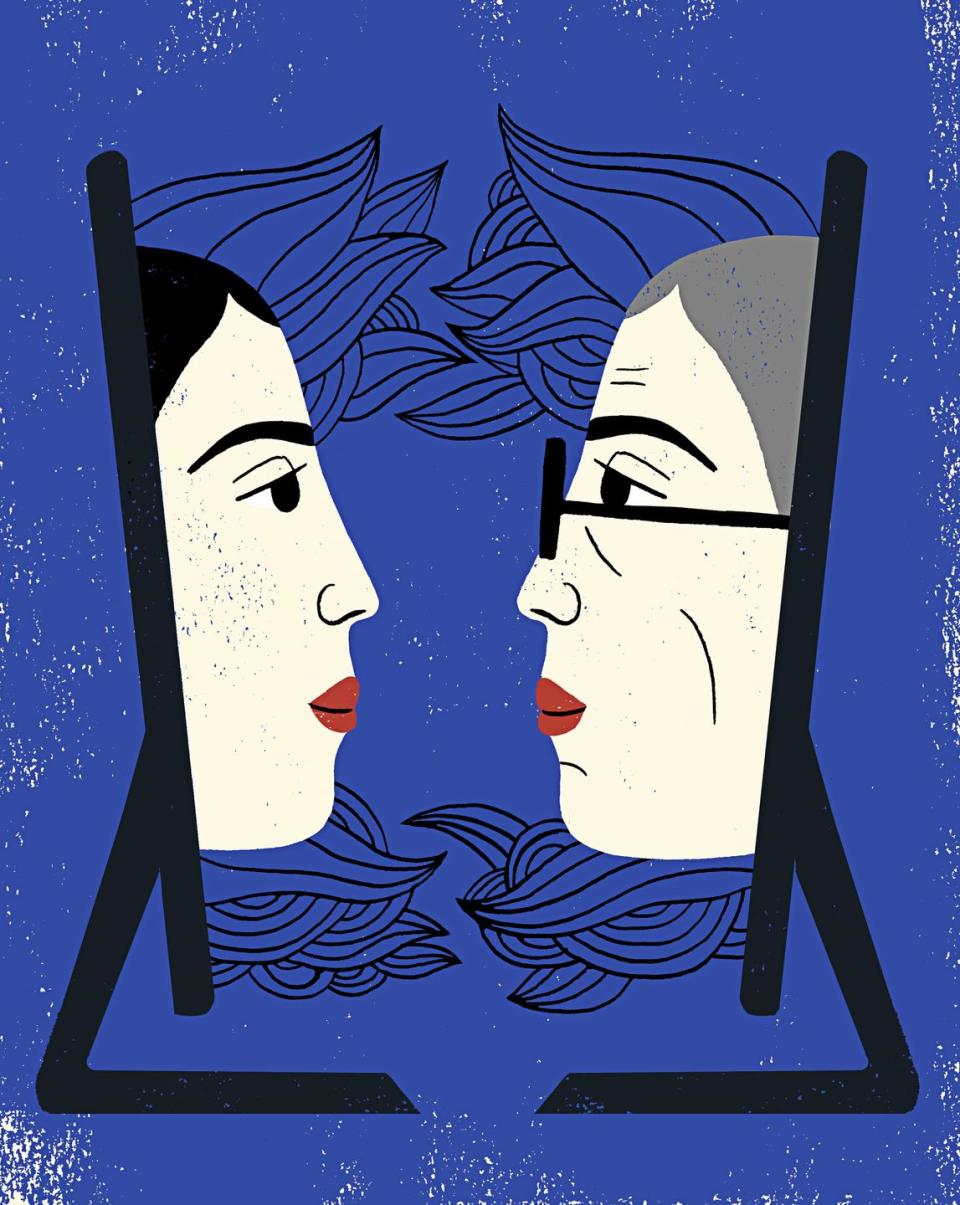
For the rest of the week, we chose activities that precluded conversation. In the car, in movie theaters, on park benches, we sat stiffly, facing forward, mouths pursed in matching straight lines.
In the year or so after, we barely spoke. Then, in March 2020, I FaceTimed my mother to settle her into lockdown. For the first time in our lives, we were facing the same anguish, and this time, it wasn’t each other. We were both in the high-risk 65-and-over demographic, both living in virus-saturated cities. Staring into the face of my white-haired, clear-eyed mom as the world shut down around us, some cold, locked place in me opened up. A friend’s dad had just died of Covid. This call, or the next, could be our last.
“We still have time to change our story,” I said. “I want to, Mom. Do you?”
Her eyes widened. “I do.”
And so we began. This time—whether because of the distance the screens provided, our shared awareness of our mortality, or sheer dumb luck—it worked. We started FaceTiming a few times a week, then nightly. At first we stuck to safe talk: the horrifying president, the safest way to disinfect grapes. Gradually we ventured onto virgin vulnerable ground, trust unfurling as we shared the details of our rapidly shrinking lives. We were the ones who had carved each other’s gravest wounds. Now, as the world turned, slowly healing, slowly opening, so did we.
“Better late than never,” I say when my mom gives me dating advice for the first time, she at 92, me at 69. “I love you,” we say at the end of each call, and each time feels like the first.
The hardest relationship in my mother’s life and mine is now our best. “It’s a miracle,” we say, staring into each other’s screen eyes, 400 miles apart and closer than we ever dreamed we’d be.
This Was Us
Eleni N. Gage wonders: Why is everyone moving on without me?
My husband recently suggested we put our apartment on the market. “I know you love New York, and I did, too,” he said. “But the city has changed. I don’t love it anymore, and I don’t know if I ever will again.”
“How soon until you say that about me?” I demanded, bursting into tears. I didn’t really think he’d leave me, but his eagerness to abandon the place where we’re raising our family already felt like a betrayal.
Wisely, he backed off the idea of selling—for now, anyway. But I’ve run out of fingers and toes to count the families we know who are fleeing to the suburbs after a year in which the city’s public schools met in person sporadically, while those in tony towns a 20-minute train ride away held classes daily. My sister is moving from San Francisco to a mountaintop hamlet because quarantine made her realize that, at 43, she can work remotely from the place where she once hoped to retire. Then there are the dogs! All around me moms are adding four-legged love bombs to their families, while I can’t imagine taking care of one more living thing besides my two kids.
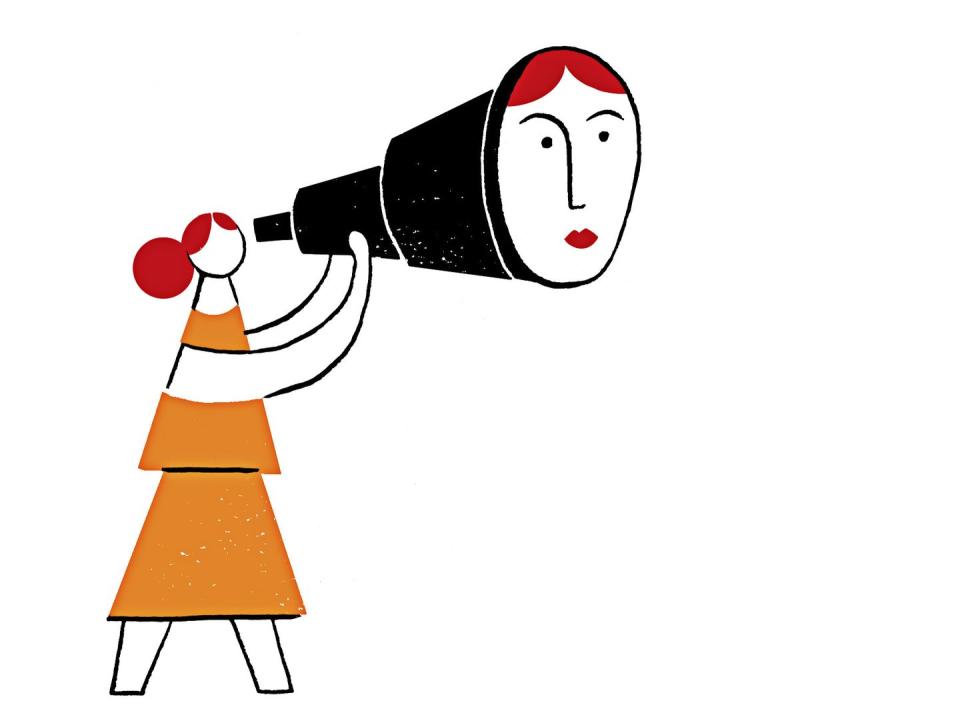
During quarantine, as I leaned out my 14th-floor window at 7 p.m. clapping for the first responders, I felt hope under my grief and fear, buoyed by the thought that we were all in this together. Now, miraculously vaxxed, I feel gratitude and relief. But other emotions keep bubbling up. Envy for the energy that emanates from others as they describe turning their Plan B into a Plan A. Sorrow as so many people I love, from my college roommate to my best mom friend, skip town. Guilt that I’m being selfish. Shock that everyone else knew we should have an escape hatch. And the nagging suspicion that they’ve cracked the code to post-pandemic life, while I’m doing it all wrong.
The fact that everyone else seems to want a new life feels like a rejection of the one I chose, the one I thought we were building together. Because here’s the thing: I don’t want to move to the suburbs. Or the mountains. And I definitely don’t want a dog. If there were a reason our family had to move—like a job in a new city—I know we’d be fine, as long as we’re together. But the sad fact is, my dream life is my old life, the one where my friends lived nearby, my kids attended school five days a week, and I went into an office where I could exercise in the in-house gym and shower afterward with no one tugging on the curtain.
While I was busy focusing on Plan A, Plan B came for me. The world has changed; I have to make the best of it. Clearly, the first step is to stop whining. So I tell myself it doesn’t matter if everyone else is embarking on a second act while I stand in the wings; I can cheer from offstage. I tell myself I don’t care where we live, as long as the rest of my family is happy. I tell myself I’m lucky that this is what I now worry about, rather than whether one of us is silently carrying a disease, harming anyone we may come across. And that last thought, at least, feels true.
You Might Also Like

